Hyundai Kona vs Jeep Compass - Differences and prices compared
Compare performance (218 HP vs 213 HP), boot space and price (23100 £ vs 34200 £ ) at a glance. Find out which car is the better choice for you – Hyundai Kona or Jeep Compass?
Costs and Efficiency:
Price and efficiency are key factors when choosing a car – and this is often where the real differences emerge.
Hyundai Kona has a decisively advantage in terms of price – it starts at 23100 £ , while the Jeep Compass costs 34200 £ . That’s a price difference of around 11143 £.
Fuel consumption also shows a difference: Hyundai Kona manages with 4.60 L and is therefore noticeable more efficient than the Jeep Compass with 5.80 L. The difference is about 1.20 L per 100 km.
In terms of energy consumption, the advantage goes to the Hyundai Kona: with 14.60 kWh per 100 km, it’s slightly more efficient than the Jeep Compass with 17.50 kWh. That’s a difference of about 2.90 kWh.
As for electric range, the Hyundai Kona performs barely noticeable better – achieving up to 514 km, about 14 km more than the Jeep Compass.
Engine and Performance:
Power, torque and acceleration are the classic benchmarks for car enthusiasts – and here, some clear differences start to show.
When it comes to engine power, the Hyundai Kona has a barely noticeable edge – offering 218 HP compared to 213 HP. That’s roughly 5 HP more horsepower.
In acceleration from 0 to 100 km/h, the Hyundai Kona is slight quicker – completing the sprint in 7.80 s, while the Jeep Compass takes 8.50 s. That’s about 0.70 s faster.
In terms of top speed, the Hyundai Kona performs somewhat better – reaching 210 km/h, while the Jeep Compass tops out at 188 km/h. The difference is around 22 km/h.
There’s also a difference in torque: Jeep Compass pulls clearly perceptible stronger with 345 Nm compared to 265 Nm. That’s about 80 Nm difference.
Space and Everyday Use:
Cabin size, boot volume and payload all play a role in everyday practicality. Here, comfort and flexibility make the difference.
Both vehicles offer seating for 5 people.
In curb weight, Hyundai Kona is clearly perceptible lighter – 1370 kg compared to 1667 kg. The difference is around 297 kg.
In terms of boot space, the Jeep Compass offers somewhat more room – 550 L compared to 466 L. That’s a difference of about 84 L.
In maximum load capacity, the Jeep Compass performs somewhat better – up to 1561 L, which is about 261 L more than the Hyundai Kona.
Who wins the race in the data check?
The Hyundai Kona holds a decisive overall lead in the objective data comparison.
This result only shows which model scores more points on paper – not which of the two cars feels right for you.
Costs and Consumption
View detailed analysis
Engine and Performance
View detailed analysis
Dimensions and Body
View detailed analysis

Hyundai Kona
Hyundai Kona
The Hyundai Kona wears its personality on the outside with bold styling and sprightly handling that turns city driving into something a little more fun than a commute. It blends practical space, modern tech and sensible running costs into a compact, stylish package — a smart pick if you want flair without paying luxury prices.
details



Jeep Compass
The Jeep Compass packs classic Jeep styling with a surprisingly composed demeanor, equally at home turning heads in the city or tackling a weekend dirt track. Inside it's a pragmatic, user-friendly compact SUV that prioritizes comfort and versatility — a smart pick if you want a dose of adventure without giving up everyday sense.
details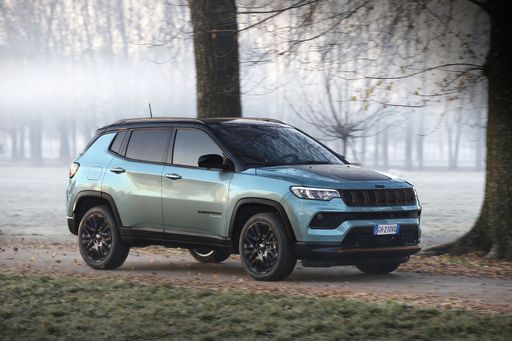
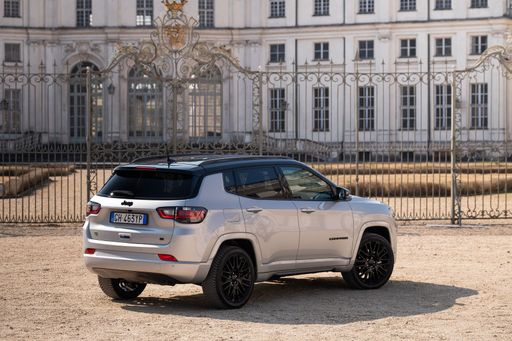
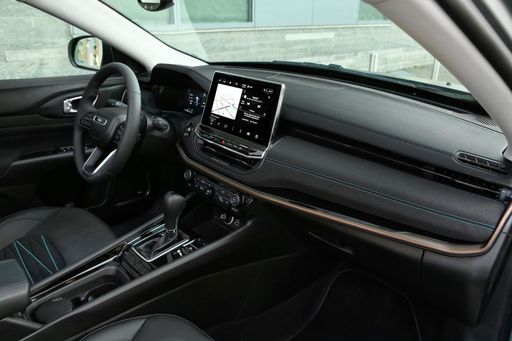
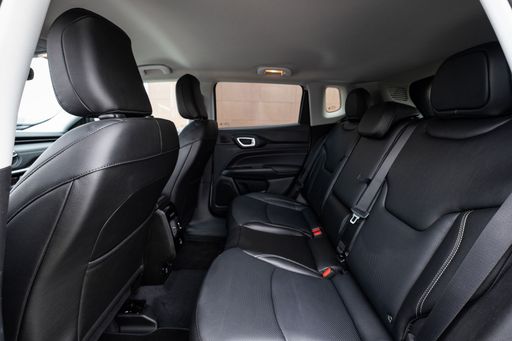
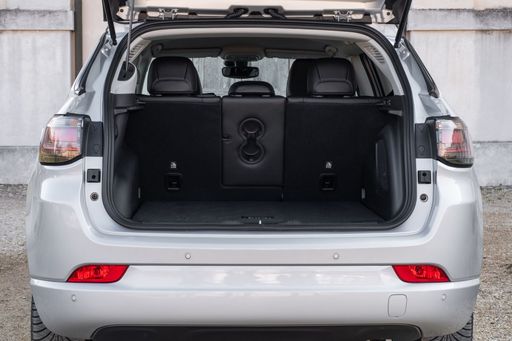
Costs and Consumption |
|
|---|---|
|
Price
23100 - 41600 £
|
Price
34200 - 43200 £
|
|
Consumption L/100km
4.6 - 7 L
|
Consumption L/100km
5.80 L
|
|
Consumption kWh/100km
14.6 - 16.8 kWh
|
Consumption kWh/100km
17.50 kWh
|
|
Electric Range
377 - 514 km
|
Electric Range
500 km
|
|
Battery Capacity
1.3 - 65.4 kWh
|
Battery Capacity
74 kWh
|
|
co2
0 - 163 g/km
|
co2
0 - 130 g/km
|
|
Fuel tank capacity
38 - 47 L
|
Fuel tank capacity
55 L
|
Dimensions and Body |
|
|---|---|
|
Body Type
SUV
|
Body Type
SUV
|
|
Seats
5
|
Seats
5
|
|
Doors
5
|
Doors
5
|
|
Curb weight
1370 - 1773 kg
|
Curb weight
1667 - 2198 kg
|
|
Trunk capacity
466 L
|
Trunk capacity
550 L
|
|
Length
4350 - 4385 mm
|
Length
4552 mm
|
|
Width
1825 mm
|
Width
1928 mm
|
|
Height
1580 - 1585 mm
|
Height
1675 mm
|
|
Max trunk capacity
1300 L
|
Max trunk capacity
1561 L
|
|
Payload
420 - 490 kg
|
Payload
-
|
Engine and Performance |
|
|---|---|
|
Engine Type
Electric, Petrol, Full Hybrid
|
Engine Type
Petrol MHEV, Electric
|
|
Transmission
Automatic, Manuel
|
Transmission
Automatic
|
|
Transmission Detail
Reduction Gearbox, Manual Gearbox, Dual-Clutch Automatic
|
Transmission Detail
Dual-Clutch Automatic, Reduction Gearbox
|
|
Drive Type
Front-Wheel Drive, All-Wheel Drive
|
Drive Type
Front-Wheel Drive
|
|
Power HP
115 - 218 HP
|
Power HP
145 - 213 HP
|
|
Acceleration 0-100km/h
7.8 - 11.9 s
|
Acceleration 0-100km/h
8.5 - 10.3 s
|
|
Max Speed
162 - 210 km/h
|
Max Speed
180 - 188 km/h
|
|
Torque
200 - 265 Nm
|
Torque
230 - 345 Nm
|
|
Number of Cylinders
3 - 4
|
Number of Cylinders
3
|
|
Power kW
85 - 160 kW
|
Power kW
107 - 157 kW
|
|
Engine capacity
998 - 1598 cm3
|
Engine capacity
1199 cm3
|
General |
|
|---|---|
|
Model Year
2024 - 2025
|
Model Year
2025
|
|
CO2 Efficiency Class
A, D, C, E, F
|
CO2 Efficiency Class
D, A
|
|
Brand
Hyundai
|
Brand
Jeep
|
Is the Hyundai Kona offered with different drivetrains?
Available configurations include Front-Wheel Drive or All-Wheel Drive.
